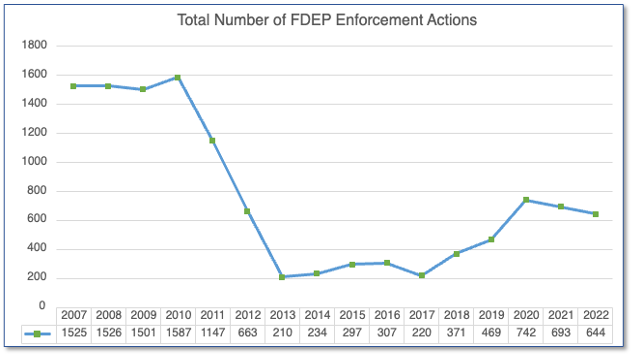FOR IMMEDIATE RELEASE
Tuesday, July 25, 2023
CONTACT
Tim Whitehouse, (240) 247-0299 twhitehouse@peer.org
Alexandra Bueno, Buenoalexandra94@gmail.com
Florida’s Environment Spirals Downward Under DeSantis
Nosedive in Anti-Pollution Enforcement Leading to Declining Water Quality
Washington, DC —After a promising first two years, anti-pollution enforcement under Florida Governor Ron DeSantis has sharply declined, according to a new analysis by Public Employees for Environmental Responsibility (PEER). This fall-off has occurred amid the proliferation of toxic algae blooms, more sewage overflows, and mass die-offs of manatees in Florida waters.
In the last two years of the DeSantis administration, state records show that environmental enforcement actions have dipped well below historical averages. In 2022 (the last year for which complete figures are available), the total number of enforcement actions taken by Florida’s Department of Environmental Protection (DEP) was 59 percent below what they were in 2010 and has fallen in each of the last two years.
These enforcement drops are manifest in both Florida’s waters and lands, especially wetlands:
-
- Despite massive and increasing amounts of sewage being released into the state’s waterways, domestic wastewater enforcement actions in recent years have dropped from 125 in 2020 to only 82 in 2022, less than half the average of 175 actions from 2005 to 2010;
- Florida ranks first in the nation for the highest total acres of lakes too polluted for swimming or healthy aquatic life, with the number of impaired estuaries and lakes failing to meet minimum water quality standards on the rise; and
- After winning extensive new authority during the Trump administration for wetlands protections, dredge and fill enforcement actions in 2022 plummeted by nearly 40% from the year before to a level more than two-thirds in the number of such actions since 2005.
“By all measures, the pollution burden placed on Florida’s lands and waters continues to grow,” stated PEER Executive Director Tim Whitehouse, a former senior enforcement attorney with the U.S. Environmental Protection Agency, pointing out that despite more money for environmental programs, Gov. DeSantis has supported several measures that make enforcement more difficult. “Throwing more money at the problem fall short if you do not enforce anti-pollution laws.”
Perhaps the most prominent victims of the state’s deteriorating water quality are Florida manatees. In 2021 and 2022, almost 2,000 manatees died – nearly 20 percent of the population – mostly from starvation due to the loss of their main food source, seagrass. Another 355 manatees have died just between January and mid-July of this year.
“Florida’s environment appears to be at a tipping point, with all indicators pointed in the wrong direction,” added PEER Board Member Alexandra Bueno, a resident of Saint Petersburg, noting that since 2010, Florida’s population has grown by approximately 20% while enforcement levels have dropped by more than half. “Facing the challenges of climate change, toxic algae blooms, and a growing population, the priority placed on environmental enforcement should be growing, not shrinking.”
PEER has issued similar annual reports on the state of Florida’s environmental enforcement every year since 2004.
###
Explore annual PEER Florida Enforcement reports from 2004 through 2021
